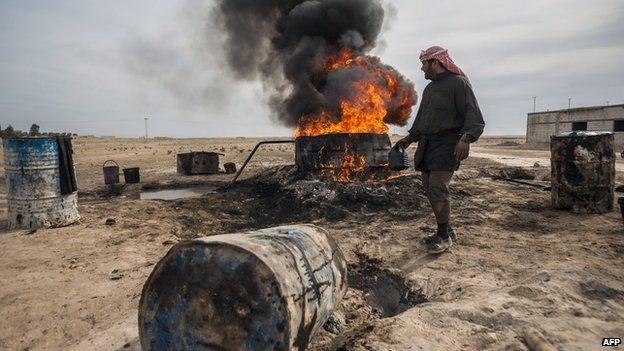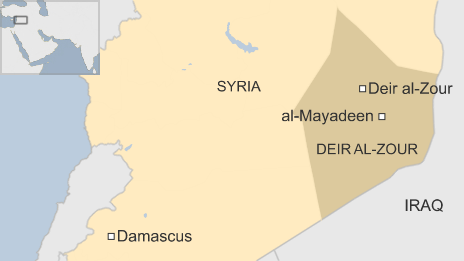Islamic State crisis: US special forces in Syria raid
- Published

Eastern Syria's oil has been a key source of revenue for IS
The US says its special forces have killed a senior Islamic State (IS) member and captured his wife in a rare ground raid in eastern Syria.
Abu Sayyaf helped direct oil, gas and financial operations for IS, as well as holding a military role, said a US Department of Defense statement, external.
It said forces tried to capture him, but he was killed after engaging them.
It is the first time the US is known to have carried out a ground operation to attack IS within Syria.
The operation was authorised by President Barack Obama and was carried out by forces based in Iraq.
US officials said Abu Sayyaf was Tunisian, with one official telling CNN he was the chief financial officer "of all of [IS]" and that the US had seized "reams of data on how ISIS operates, communicates and earns its money".
On Arabic social media, however, Abu Sayyaf was not being spoken of as a known public figure.
Oil and gas have been an important source of revenue for IS, which gained swathes of territory in Syria and Iraq last year.
On Saturday, the group took control of the northern part of the ancient Syrian city of Palmyra, which it has been advancing on for three days, according to the Syrian Observatory for Human Rights - a UK-based network that uses activists within Syria.
In other developments
More civilians were killed in Syrian government air raids in Idlib province, the Observatory reported
Turkey said it had shot down a Syrian helicopter after it crossed into Turkish airspace, though Syrian state media indicated that the aircraft was a drone.
The US said the operation in Syria was conducted "with the full consent of Iraqi authorities", though it did not inform the Syrian government in advance.
"We have warned [President Bashar al-Assad's] regime not to interfere with our ongoing efforts against [IS] inside of Syria," said National Security Council spokeswoman Bernadette Meehan, adding that "the Assad regime is not and cannot be a partner in the fight" against IS.

Analysis: Rajini Vaidyanathan, BBC News, Washington
This was a rare, publicly announced operation for US special forces. In Iraq, the US is working with the government, but in Syria, where it isn't, these kind of operations are riskier.
For months now, coalition forces have been targeting IS militants from the air - but the decision to send forces on the ground had already been outlined by President Obama in a resolution to Congress. In February he said they would be used "if we had actionable intelligence about a gathering of [IS] leaders, and our partners didn't have the capacity to get them".
The US has been criticised for not doing enough to contain IS, and the scalp of Abu Sayyaf is being hailed as a key victory. But taking out targets this way will lead to accusations of mission creep - even if President Obama stressed to Congress that using special forces didn't amount to another ground war, and that in the fight against IS flexibility was key.

The Pentagon said Abu Sayyaf's wife, Umm Sayyaf, is suspected of being an IS member and of being complicit in the enslavement of a young Yazidi woman who was rescued in the raid.
It said it believed at least 12 militants had been killed at the scene, that there was hand-to-hand fighting and that militants had tried to use women and children as shields.
Umm Sayyaf has been taken into military detention in Iraq.
One source with contacts in Deir al-Zour told the BBC that the operation lasted for about 30 minutes around dawn in the residential quarters of the al-Omar oil field, which houses about 500 families of IS fighters.
The bodies of 13 IS militants, as well as many more who were injured, were later brought to the town of al-Mayadeen, he said.

Syrian state media reported earlier on Saturday that government forces had killed at least 40 IS fighters, including a man they described as IS's "oil minister", in an attack in Deir al-Zour province on the country's largest oil field.
The Syrian Observatory said the report was incorrectly taking credit for the US raid.
In Iraq on Saturday, IS militants tightened their grip over the centre of the city of Ramadi but reportedly withdrew from a key government compound they had seized a day earlier.
Neither IS nor its supporters on social media were commenting publicly on the raid against Abu Sayyaf, with Twitter posts focussing instead on Ramadi.
The US has been carrying out air strikes against IS in Iraq and Syria since August last year. Shortly after they began, the Pentagon said there had been a failed raid in Syria to free American hostages - the only other ground operation inside the country it has acknowledged.